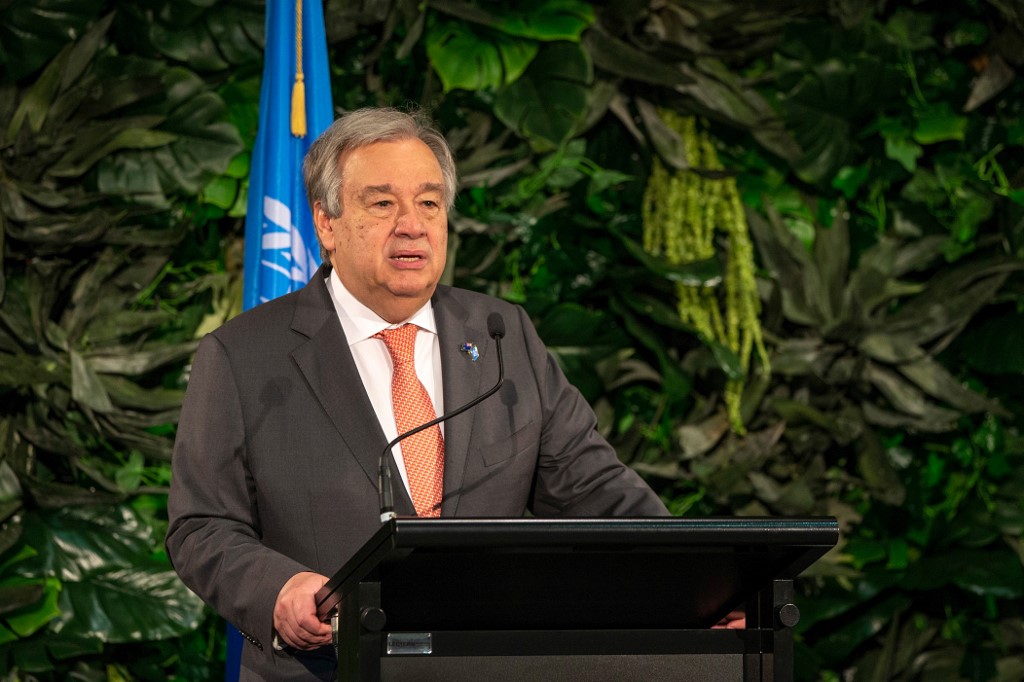Malawi peacekeeper awarded UN medal for bravery posthumously
UNITED NATIONS — Secretary-General Antonio Guterres awarded the United Nations’ highest medal for bravery on Friday to a peacekeeper from Malawi who saved a wounded comrade in the Ebola-stricken region of eastern Congo and was then killed by rebel fire.
Guterres called the late Private Chancy Chitete a “true” hero, saying the world doesn’t have many of them, before presenting his widow, Lachel Chitete Mwenechanya, with the “Captain Mbaye Diagne Medal for Exceptional Courage” at a ceremony.
Chitete is only the second recipient of the U.N.’s highest peacekeeping award, which was established by the Security Council in 2014. The first medal was presented in 2016 to the family of Diagne, a Senegalese U.N. military observer who saved hundreds of lives in Rwanda during the 1994 genocide, before being killed.
Guterres said that when Tanzanian and Malawian peacekeepers came under heavy fire last November while conducting an operation to stop attacks on local towns by the rebel Allied Democratic Forces militia that was disrupting the response to the Ebola outbreak, “private Chitete and his unit held their ground and provided covering fire.”
This allowed “those in harm’s way to move to a secure location,” the U.N. chief said. But before Chitete was to pull back “he saw a badly wounded Tanzanian peacekeeper, Corporal Ali Khamis Omary, who lay stranded as the militia approached.”
Article continues after this advertisement“Private Chitete knew he had to act, or his comrade was sure to die,” Guterres said. “He dragged Corporal Omary back to an area of greater safety as bullets were flying.”
Article continues after this advertisementAs Chitete was protecting his comrade and administering first aid, he was hit by rebel fire, the secretary-general said.
Chitete and Omary were both evacuated for medical treatment.
“Corporal Omary survived,” Guterres said. “Private Chitete did not.”
“Private Chitete’s selfless heroism and sacrifice helped the peacekeepers achieve their objective and dislodge the militia from its stronghold and that was vital for the Ebola response to go on,” the U.N. chief said.
Omary, who was not at Friday’s ceremony, praised his friend and “trusted brother in arms” in a eulogy after his death, saying: “I owe private Chitete a lot for risking his life to save me.”
Guterres also presented the Dag Hammarskjold medal posthumously to 119 U.N. military and police personnel, international civil servants, national staff and U.N. Volunteers from 38 countries who lost their lives while serving in 12 different U.N. peace operations around the world.
He quoted Hammarskjold, the second secretary-general of the United Nations who was killed in a plane crash in 1961 on a peace mission to then newly independent Congo, as saying: “The pursuit of peace and progress, with its trials and its errors, its successes and its setbacks, can never be relaxed and never abandoned.”
Guterres said at a separate ceremony that the best way to honor those who lost their lives working for the United Nations is “by living up to his call to never abandon the pursuit of peace.”
After the 119 names were read, a bugler played the “Last Post” in a final tribute.
